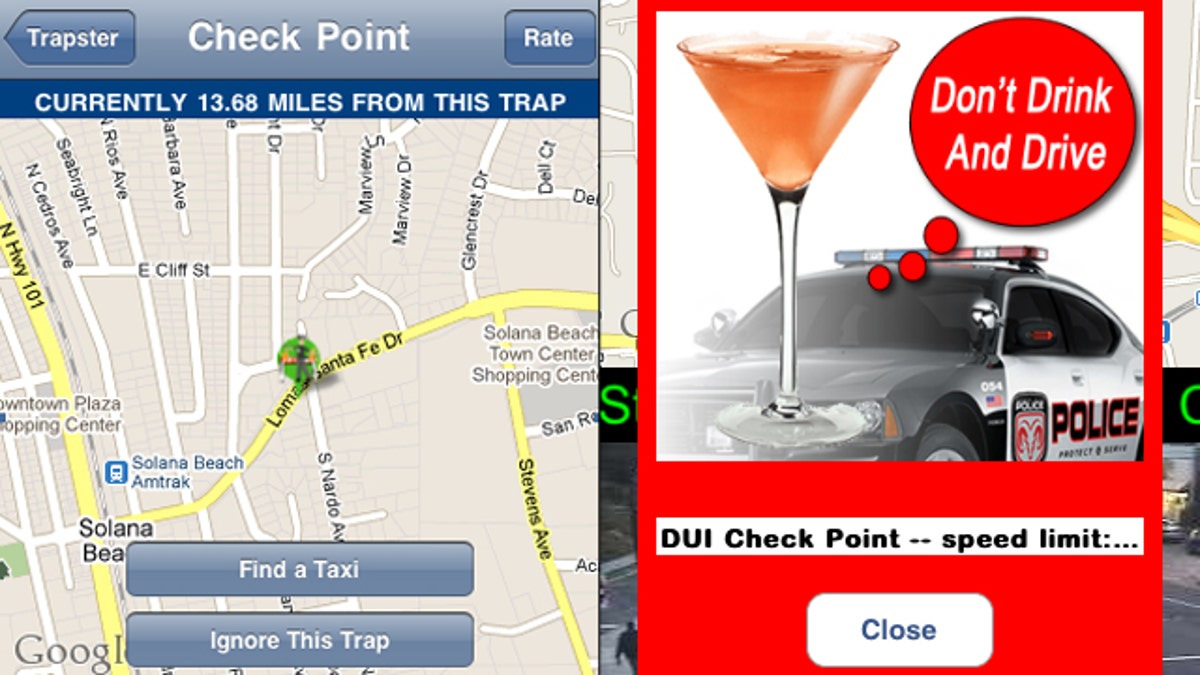
Shown here are screens showing the Trapster application, left, and PhantomALERT, right. (Trapster/PhantomALERT)
A group of senators unintentionally sent sales through the roof for the maker of a smartphone app that alerts drivers to DUI checkpoints, after they called on Apple and other manufacturers to ban the product.
Joe Scott, CEO of PhantomALERT, told FoxNews.com on Wednesday that downloads are up by 5,000 percent and sales are up by 3,000 percent since the four senators voiced concern about the product, prompting a wave of media coverage in technology publications.
"In a way, they're kind of helping us," Scott said.
That wasn't what the senators were going for. Sens. Harry Reid, D-Nev.; Charles Schumer, D-N.Y.; Frank Lautenberg, D-N.J.; and Tom Udall, D-N.M., fired off a letter Tuesday that described such applications as a menace to road safety. They called on Apple, Google and BlackBerry maker Research in Motion to ban applications that alert users to drunk-driving checkpoints, or at least remove that function from them.
"We appreciate the technology that has allowed millions of Americans to have information at their fingertips, but giving drunk drivers a free tool to evade checkpoints, putting innocent families and children at risk, is a matter of public concern," they wrote. "We hope that you will give our request to make these applications unavailable immediate consideration."
The senators announced Wednesday that Research in Motion has since agreed to remove the apps from its online store.
While the letter did not name the applications in question, Schumer said they were talking about PhantomALERT and Trapster. The latter gives users an interactive network where they can share the location of speed traps and other "enforcement" areas with other users. PhantomALERT offers a database -- for GPS and smartphones -- of everything from railroad crossings to red-light cameras to DUI checkpoints.
Trapster, with more than 11 million users, is much more popular than PhantomALERT. Trapster creator Pete Tenereillo said that, as such, the company did not get a huge spike in downloads after the senators raised their complaint.
But both executives rejected the argument that the applications are meant to help drunk drivers avoid getting caught. Rather, they said the apps make users think twice about driving drunk because they become more aware of how easy it is to get caught.
"Our obvious and strong hope is that we would not encourage people to drive drunk," Tenereillo said, describing Trapster as a "deterrent." He noted the application gives users a prompt to "find a taxi" if such a checkpoint pops up.
Besides, Tenereillo said, the DUI checkpoint feature is one of more than two-dozen, including a function that alerts drivers to roadkill like dead elk, which he said could be particularly harmful.
"DUI checkpoints ... are reported daily on Twitter and Facebook. I don't know if those are going to be shut down," he said.
Scott likened PhantomALERT to run-of-the-mill road signs that announce DUI checkpoints, or press releases sent out by local police departments about stepped-up enforcement.
"If (the senators) actually found out what PhantomALERT is all about and how we help drivers they'd actually support us," he said. "It's just a knee-jerk reaction. ... We help drivers avoid traffic tickets by helping them obey traffic laws."
He shared one testimonial from a supposed user claiming to have gotten a ride home from a friend one libation-filled night after checking PhantomALERT and seeing a checkpoint nearby.
But Schumer said the overriding effect of the apps is to give drunk drivers a clear route on the roads after partying.
"These applications are nothing more than a how-to guide in avoiding law enforcement and they provide drunk drivers with the tools they need to go undetected, putting innocent families and children at risk," Schumer said in a written statement.
